10 Best Online Selling Platform in 2025: Top Picks for Beginners & Experts
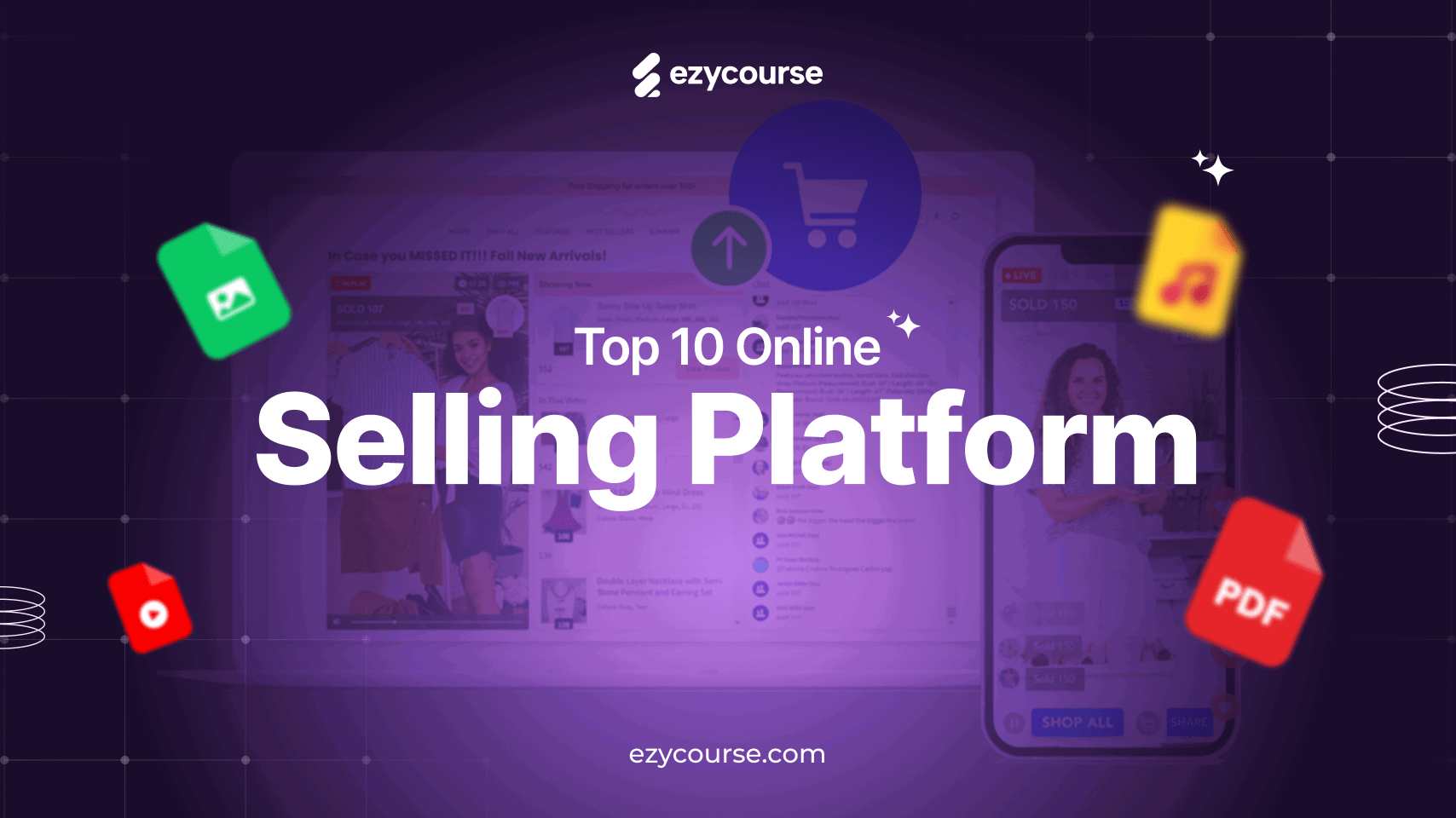
10 Best Online Selling Platform in 2025: Top Picks for Beginners & Experts
With over 2.77 billion online shoppers in 2025, you can guess how demanding it is to have a platform to sell items online. Well, picking the best online selling platform is definitely not a piece of cake and often requires you to choose one wisely.
To help you out in this hustle life with everything about online selling to amazing platforms, we’ve got you covered.
Here, we’ll break down the ideal options that you can choose with their proper review, pros, cons, and so on. Let’s go!
What Are the Online Selling Platforms
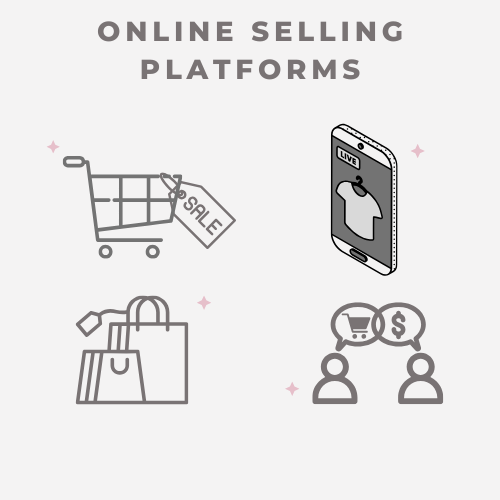
Online selling platforms or marketplaces are sites or apps that let you sell things on your own. You can also think of them like a virtual shopping mall in which your buyers can see the items and then buy them from you.
Instead of building your own store from scratch, you get to display your items in a place. And most of the time, online selling platforms come with shoppers, structures, and systems to help you sell easily.
Plus, these online selling platforms or marketplaces are grouped into different categories. It’s based on who sells and buys:
B2B (Business to Business): Businesses sell to others like bulk suppliers selling to other retailers.
B2C (Business to Consumer): Businesses sell directly to everyday buyers.
C2C (Consumer to Consumer): Regular people sell to each other (like on eBay or Facebook Marketplace).
D2C (Direct to Consumer): Brands sell directly to the final buyer, without any middlemen.
These platforms also make it simple to start selling online without needing much tech knowledge or skill. Besides, you don't have to design a site, manage payments, or figure out how to get people to visit your site.
In other words, everything is already built in. You just register as a seller, upload your product listings, and you’re ready to go.
What Is the Best Platform to Sell Online for Beginners
As a seller, looking for the ideal place to sell online is vital. To make your struggle easier, we have collected ten options that you can try to sell online.
Here’s the list of all the online selling platforms:
1. EzyCourse
2. Esty
3. Shopify
4. Gumroad
5. WooCommerce
6. TikTok Shop
7. Wix
8. Squarespace
9. Podia
10. Hostinger
Let's begin by showing you the top 10 online selling platforms below.
#1 EzyCourse (Best All-in-one Online Selling Platform)
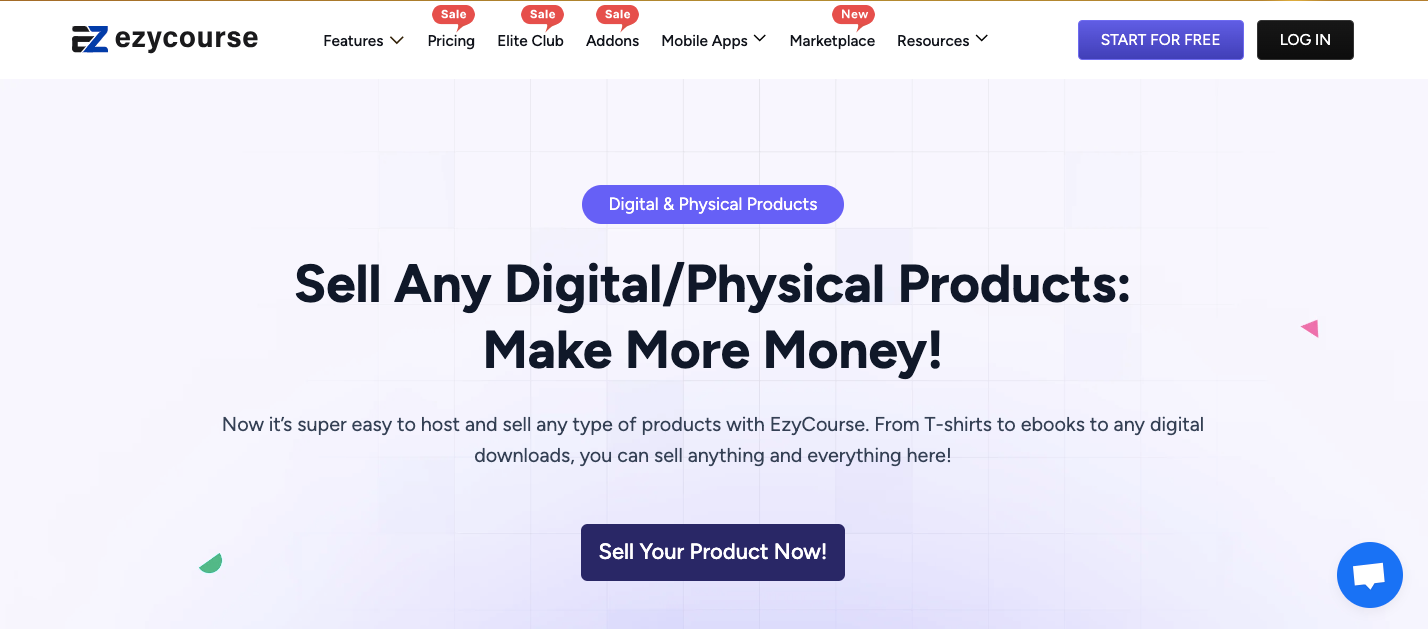
EzyCourse is an all-in-one platform to sell any type of digital or physical product. The platform allows you to sell online courses, digital products, physical items, run memberships, build communities, create a marketplace like Udemy, and so on.
With a drag-and-drop builder, you can easily build your own storefront and start selling in just a few clicks. At the same time, there is a marketplace add-on to help you create a course marketplace website.
In addition to websites, you can get your own white-label mobile app for free with the selected plans. A branded mobile app will increase the chance to reach more customers. Again, the revenue partner feature is a real gem. It also automatically splits earnings between partners using built-in tools.
With its smart upselling, you can show offers or upgrades to buyers on your sales pages. Not to mention that you can add special discounts or coupon deals with flexible payment plans. Plus, the platform offers built-in payment integrations to make payment processing easier for you.
Top Features of EzyCourse
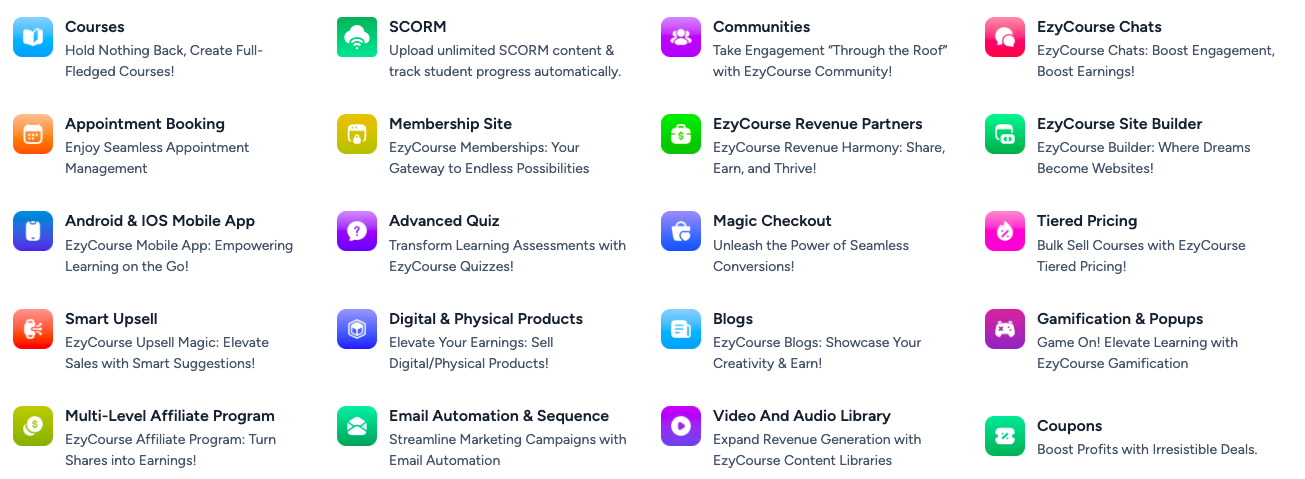
Here are a few features that you’ll get from this platform as a whole:
Create & Sell Any Digital Products Easily
It lets you build your online courses, events, appointments, communities, video library, or any other digital products using a simple drag-and-drop tool. It also lets you organize your lessons without needing any technical skills.
Get Paid from Anywhere
With built-in payment systems, you can allow your buyers to buy from you in any currency. Plus, it doesn’t need third-party apps to get payments from diverse countries.
Build Your Website Fast
You can use 250+ ready-to-use templates and design blocks to make your content quickly with no coding. Besides, it allows you to sell your own templates and blocks to make extra income.
Email Marketing Made Simple
You can make newsletters or emails to your buyers or students to reach out. With this option, it lets you segment your contacts, schedule emails, and track performance.
Mobile-friendly UI with App Benefit
It offers a great UI that showcases your items properly. Plus, this works well on all devices like phones, tablets, or computers. Plus, EzyCourse offers branded Android and iOS mobile apps.
Track and Manage with Analytics
It helps you see how your buyers are behaving, send them messages, and check what they buy to understand the sales pattern.
Sell Digital and Physical Items
You can sell digital products, physical items, or services with this platform. It also lets you sell things like eBooks, audio, video, PDF, zip files, merchandise, and so on.
Find the Affiliate Plans
It lets you make your buyers promote your products for a commission. This also helps you reach more people without doing all the marketing yourself.

EzyCourse Pros
All-in-one platform to create, sell, and manage content
Create and sell any digital or physical products
No code website builder
Several ways to earn with subscriptions, memberships, or one-time sales.
Find email and marketing automation tools.
Affiliate system added to grow sales through referrals.
Supports payments via Stripe, PayPal, RazorPay, and more.
Get built-in tools to market your items or create.
Affordable pricing plan that suits all budgets.
Built-in live webinars
EzyCourse Cons
No free plan
Why Go for EzyCourse?
EzyCourse is one of the best online selling platforms. It is an ideal platform for any type of solopreneurs, teachers, trainers, or business owners who want to sell digital or physical products online. You can easily sell any items online ranging from courses to communities, to memberships to ebooks, videos, PDFs, digital arts, audio files, zip folders, and so on. Or even you can sell any type of physical products from your own store.
It also helps you manage your sales, reach more people, and grow faster as an all-in-one platform. Overall, EzyCourse is a one-stop solution for any type of online course business, membership business, eCommerce sites, and so on.
Here’s what you get:
Sell any type of products online.
Build a complete white-label website.
Build your own course marketplace platform like Udemy.
Easy tools to manage sales.
Full control over payments and commissions.
Host live events.
Manage payments easily

EzyCourse Pricing
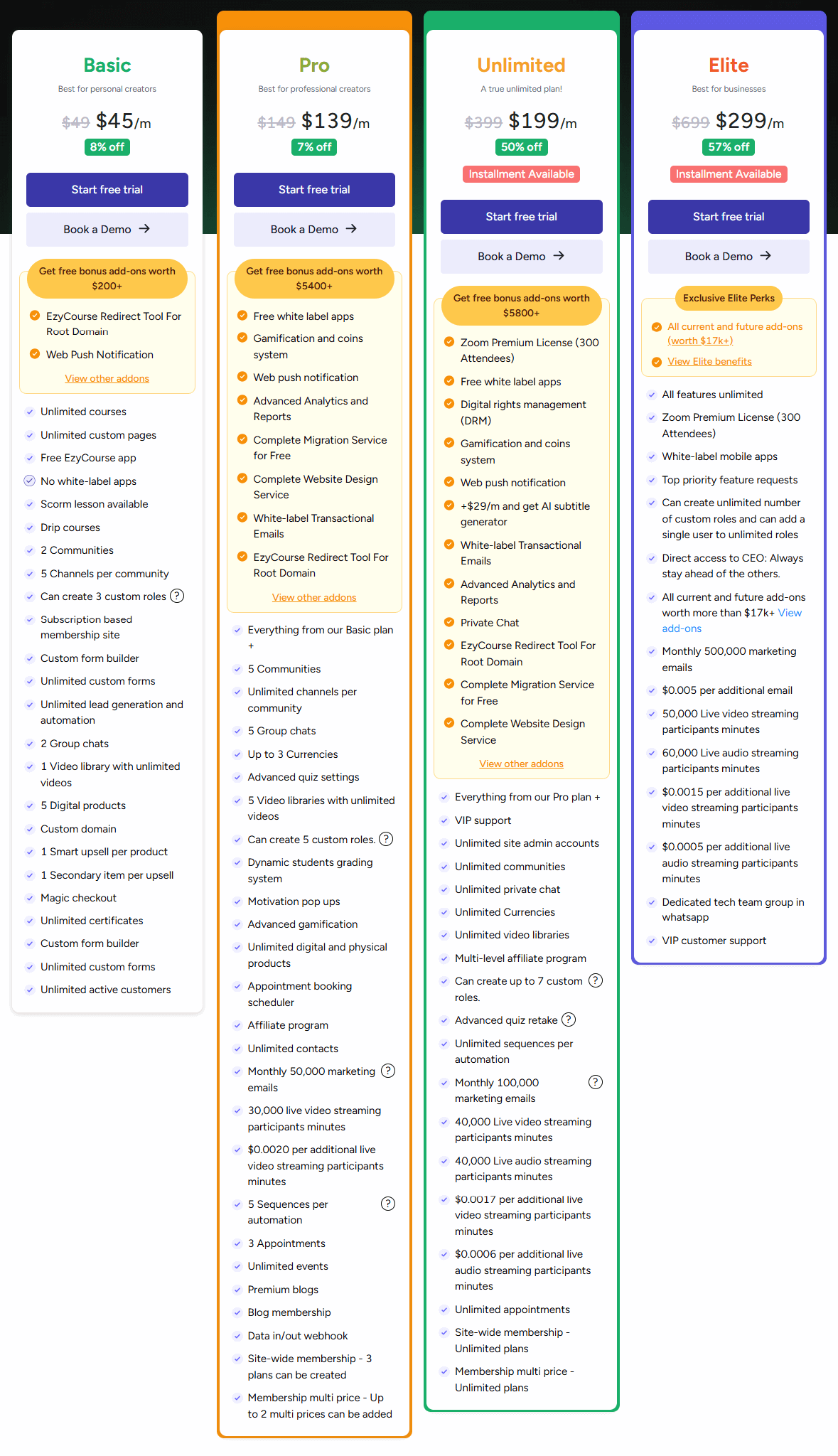
1. Basic Plan: $45 per month on the annual plan.
5 digital products.
Countless courses, pages, and membership sites.
Adds branded app & video library.
1 smart upset per product with magic checkout.
And more options.
Best For: Solo creators and digital educators who are making a few digital products with vital tools.
2. Pro Plan: $139 per month on the annual plan.
All features in the Basic Plan are added, which include:
Countless digital and physical products.
50,000 marketing emails per month.
Affiliate plan and book appointments.
Better analytics and management tools.
And more options.
Best For: Business owners, coaches, and online sellers who sell both online and physical items with email and affiliate tools.
3. Unlimited Plan: $199 per month on the annual plan.
All features in the Pro Plan are added, which include:
Free white-label apps.
VIP support with countless currencies.
Multi-level affiliate plans.
100,000 marketing emails per month.
Countless plans for multi-price membership.
And more options.
Best For: Established brands, marketers, and course creators who need advanced options, global reach, and full control.
4. Elite Plan: $299 per month on the annual plan.
All features in the Unlimited Plan are added, which include:
$17k+ value of add-ons.
Add white-label mobile apps.
500,000 marketing emails per month.
VIP customer support with the tech group on WhatsApp.
And more options.
Best For: Agencies, big enterprises, and entrepreneurs who need full-scale options, white-label branding, and premium tools.
5. EzyCourse Enterprise: $1,990 per month as starting price.
Capable of 4K video resolution.
SSD-devoted super-fast storage.
Progressive video security and safety.
Best For: Big platform, institution, and business owners who need top-tier video support for marketing and other options.

#2 Etsy
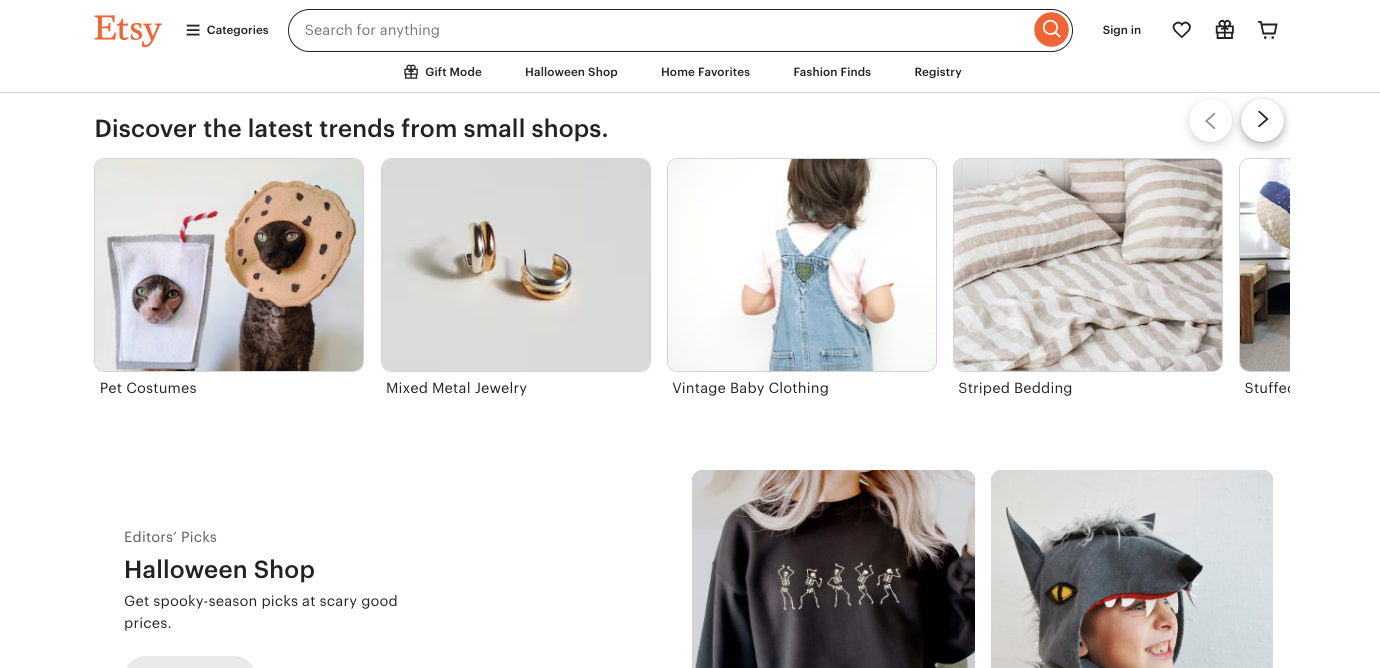
Etsy is an awesome platform for anyone who wants to sell handmade items, vintage goods, or craft supplies. It’s also made especially for artists, crafters, and small business owners who make unique items.
With this platform, you can easily create your own online shop, list products, set prices, and write product descriptions.
There are also tools to help you track your sales, manage orders, and advertise your items. Plus, you can even offer discounts and use its shipping system to send items smoothly.
To list a product, this charges $0.20 per item. It also takes a 6.5% fee on each sale, with a small payment processing fee based on location. And, many sellers on Etsy make it too competitive.
Still, this platform is a good place to start if you're new to selling online. It’s also trusted, simple to use, and gives you a chance to reach buyers around the world. With creativity and good planning, you can build a successful store on Etsy.
Top Features of the Etsy Platform
Try the Etsy Seller App to handle orders and respond to buyers.
Give a discounted shipping label directly.
Get tools to customize the shop’s outlook.
Contain ad credits using the Etsy Plus to advertise.
Make a personalized website using the platforms.
Accept payment on PayPal and other gateways.
Etsy Pros
Great for niche-specific sellers to sell handmade or antique items.
Find tons of tools to manage, promote, and grow your brand.
Get a supportive Etsy support team to reach out.
In-depth analytics added to see sales and other traffic sources.
Etsy Cons
Take transaction and off-site ads fees.
Contains more competition.
Why Go for Etsy?
If you're a creator of handmade items, vintage goods, or craft supplies, Etsy is one of the best platforms to start your online selling journey.
Unlike other platforms, it is built for creative and antique sellers. This platform also offers a wide range of tools to help you manage your shop, promote your products, and grow your brand
From marketing options to custom discounts, you get everything to make your store look professional. Plus, it gives in-depth analytics, so you can track your sales and see where your traffic is coming from.
But, this platform does take transaction fees, and competition can be high due to many sellers. Other than these downsides, it offers a solid and supportive platform to grow your brand.
Etsy Pricing
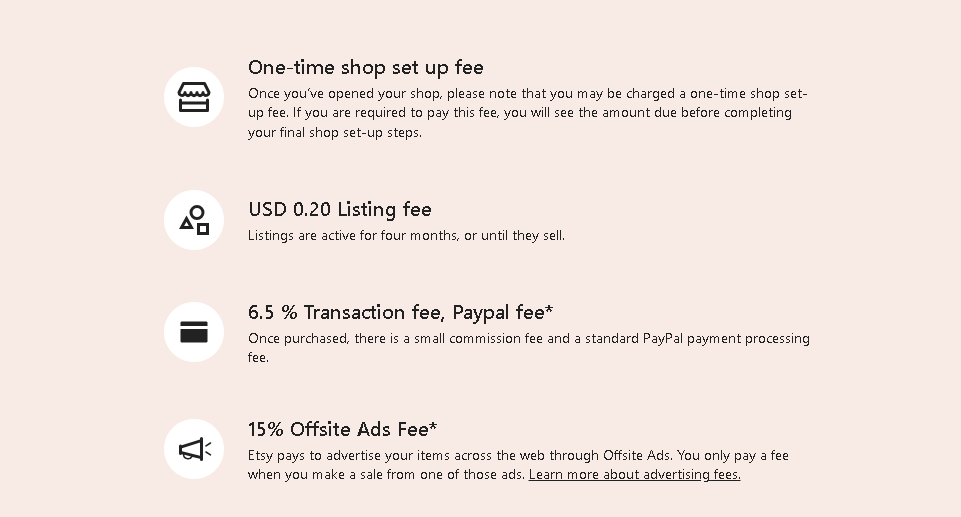
This platform takes $0.20 per listing on each sale with the 6.5% transaction fees and 15% off-site ads charges in total.
#3 Shopify

Shopify is one of the easiest ways to start your own online store. It’s also made for anyone who wants to sell products, no matter if you're a newbie or already have a business. Plus, you don’t need to know coding or web design.
With over 200+ ready-to-use templates, you can set up your store quickly and simply. As a selling platform, it offers many helpful options.
You can also list and manage products, track your inventory, and handle orders all in one place. Plus, it gives you a secure checkout, SSL certificate, and built-in payment options.
Besides, you can sell from your site. Besides, it lets you manage from one dashboard to save time and keep things organized.
However, it does have higher monthly costs and charges processing fees for card payments. If that’s an issue for you, it’s better to look for a Shopify alternative to get better options. Other than that, this platform works great for anyone who wants to sell products online.
Top Features of the Shopify Platform
Find stock analysis and tracking analytics.
Get marketing tools and store builder options.
Add discount codes, coupons, and automatic offers.
Include the checkout process to add conversion rates.
Connect with shipping providers and API access.
Contain Shopify App Store with 8000+ apps.
Shopify Pros
Protects your store against hackers and fraud with its PCI compliance system.
Loading speed is quick and contains fewer glitches.
Find tons of business suites of tools.
Offers multiple sales channels to promote items.
Shopify Cons

Cost more on the monthly plan.
0.6% to 2% card fee on payment processing.
Why Go for Shopify?
Shopify is a solid choice if you’re thinking about selling stuff online. First off, it's super secure and easy to use while being a popular platform.
In fact, it is PCI compliant, which means your store won’t get attacked by hackers and fraud. That’s also a big win when you’re handling payments and personal info.
Moreover, your store loads quickly and doesn’t freeze up or glitch like some other platforms do. That also makes your buyers shop smoothly in a less stressful way.
What’s more? It also comes with tons of built-in tools to help you run and grow your business. Whether you’re managing items, tracking orders, or doing marketing, it has everything.
Sure, the monthly plans cost a bit more, and there’s a small card processing fee (around 0.6% to 2%). But if you want a platform that’s easy to use, secure, and packed with options, Shopify’s definitely worth checking out.
Shopify Pricing
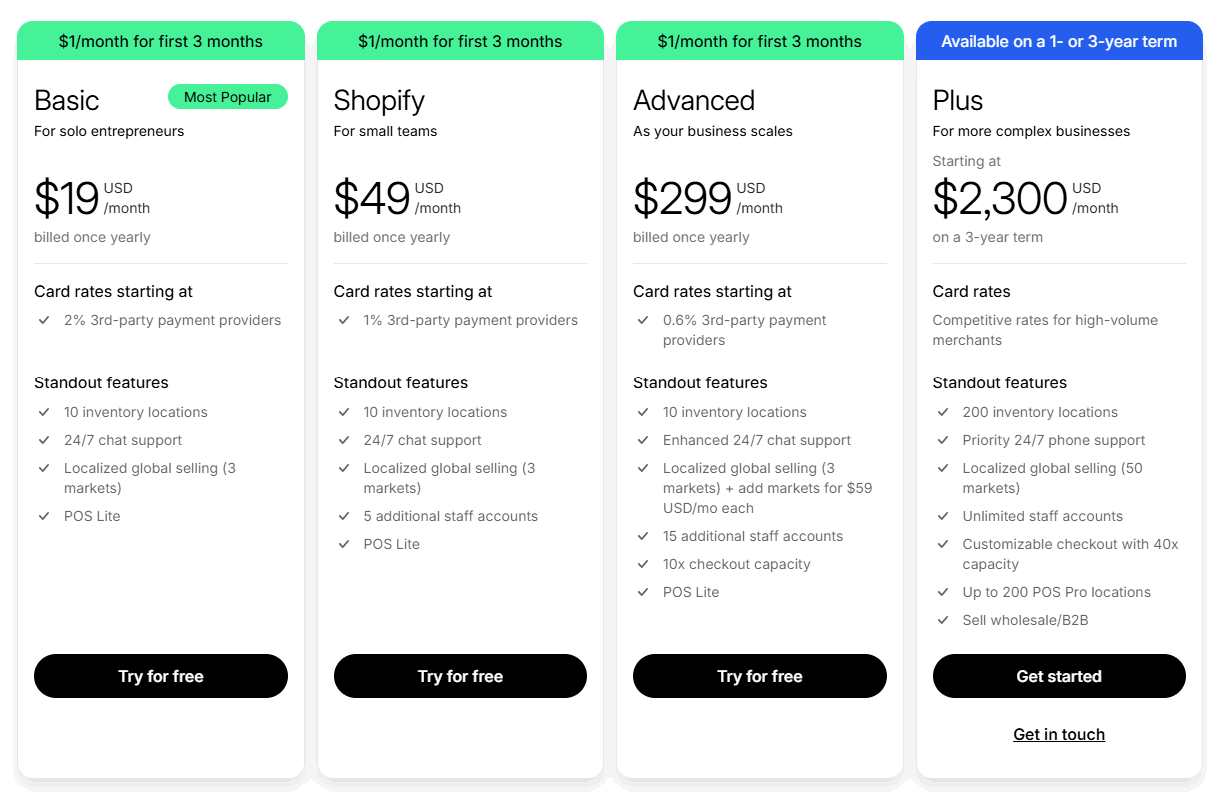
Basic Plan: $19 per month on the annual plan.
Grow Plan: $49 per month on the annual plan.
Advanced Plan: $299 per month on the annual plan.
Plus Plan: $2,300 per month on the annual plan.
Retail Plan: $89 per month.
Enterprise Commerce Plan: Custom pricing plan.
#4 Gumroad
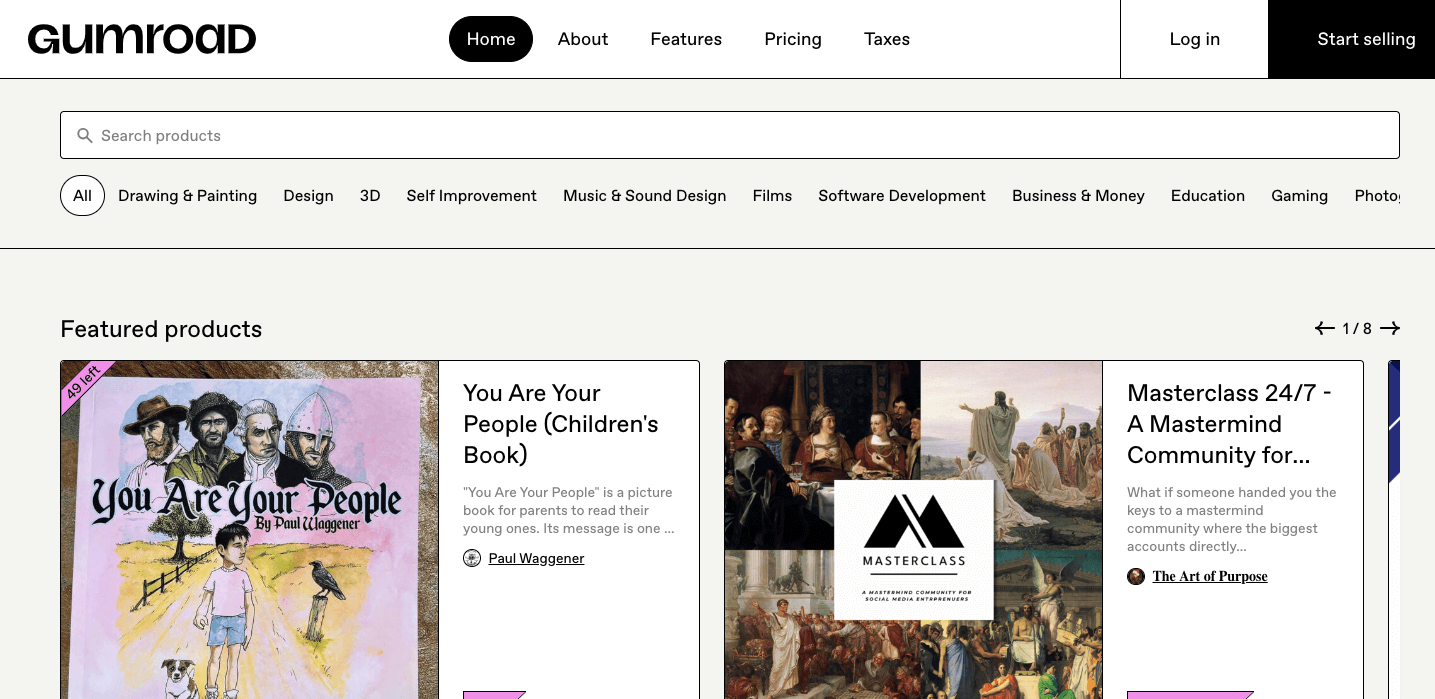
Gumroad is an easy-to-use website that helps creators sell things like eBooks, music, software, or physical items. You can also upload your product, give it a name, set a price, write a short description, and add a picture. Besides, it’ll take care of the payments for you.
Plus, this platform is pretty simple to use. You can also make a store and site to sell directly to your buyers. Plus, it gives you all the tools in place.
On top of that, this platform comes with a Discover section that helps more buyers find your items. It also keeps all buyer and seller info safe during each sale.
Plus, you can send emails to your buyers along with the membership options. Sadly, it charges a 30% fee per sale if new buyers purchase things from you. And, this has limited customization options. If that’s a big no to you, go for Gumroad alternatives.
Besides, it lets you add collaborators if you're working with others, like sharing profits or making an item together. To sum up, it’s a great platform for anyone who wants to sell their work online without any stress.
Top Features of the Gumroad Platform
Add brand logo, colors, and other things to decorate store pages.
Provide discounts, promotions, and coupons.
Monitor data and report with the analytic tool.
Include recurring revenue options like memberships and subscriptions.
Integrate with Zapier, ConverKit, and other tools.
Find email marketing options.
Gumroad Pros
Get the flexible page editor to create a storefront.
Let you customize your site layout, shades, and so on.
Accept payment from direct deposit, PayPal, and other gateways.
Sell PDF, ePub, Mobi, and so on using this platform.
Gumroad Cons
Takes a certain amount as commission per sale.
Fewer options to customize the store.
Why Go for Gumroad?
Gumroad is definitely good for selling products if you're a creator or a small business looking for a simple and affordable way to reach your audience. You can also sell directly without creating a separate website or online store.
Plus, it gives you a link to share anywhere, like email, social media, or your own site if you have one. You can also sell both digital items like eBooks, videos, software, music, and physical products.
Furthermore, it has helpful tools like email automation, discount codes, and analytics to track performance. This platform also handles all payment processing and keeps data safe, so you don’t have to worry about technical stuff or security.
If you're working with a co-author or artist, you can split earnings automatically. Yet, it can be expensive compared to other options and might contain fewer options.
In short, Gumroad is a good platform if you want simple checkout options, secure payment, and an easy-to-use UI.
Gumroad Pricing
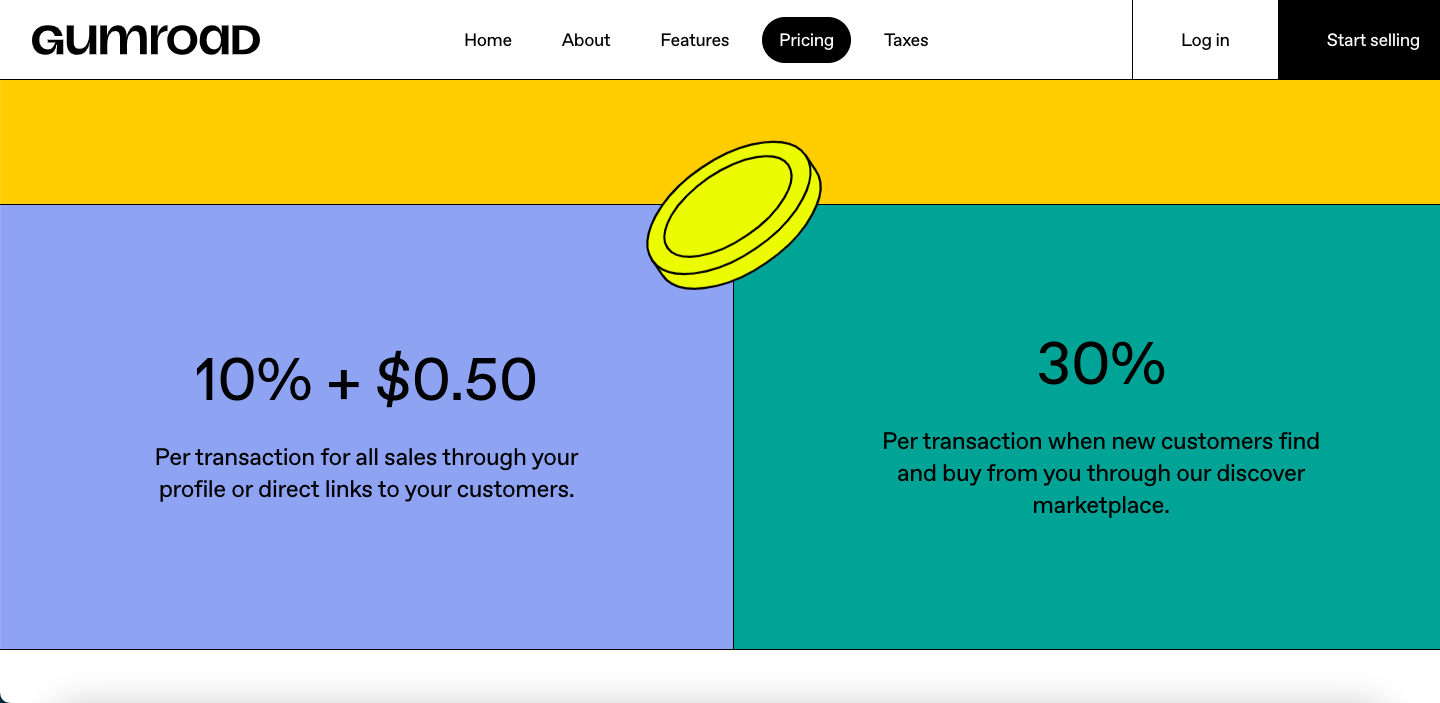
This platform takes up to a 10% transaction fee with $0.50 for listing via your profile or direct links to your buyers. But if new buyers buy from you, it takes 30% transaction fees.
#5 WooCommerce
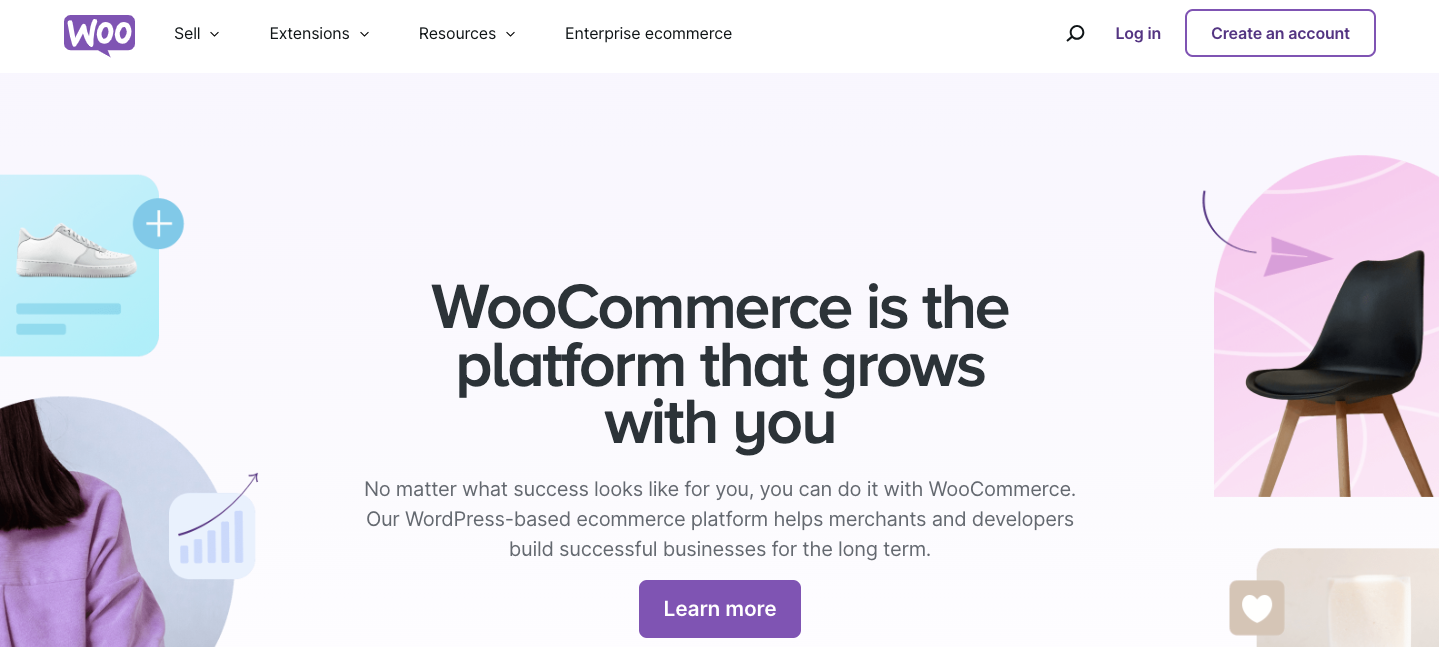
WooCommerce is a powerful and flexible platform built as a plugin for WordPress. It’s also a great choice for anyone who wants full control over their online store from creation to selling things.
Since it’s open-source and free to use, you can customize nearly every part of your shop to suit your brand and business goals.
However, while the plugin itself is free, you’ll need to invest in a hosting service, a domain name. Besides, it takes some premium plugins or themes.
With its vast plugin library, you can easily add features like inventory management, payment gateways, shipping options, and marketing tools. It’s also useful for businesses that want a tailored solution, as developers can create custom features or integrate third-party tools.
Unfortunately, it has no self-hosting options and often shows glitches. Plus, this platform lacks security options. In short, it’s ideal for anyone who wants flexibility and scalability to sell things online.
Top Features of the WooCommerce Platform
Make use of 1000+ extensions and themes
Make personalized checkout flows to add conversions.
Get local and multi-language 135+ currency support.
Increase recurring income with its subscriptions.
Find shipping solutions to save time.
Includes mobile app option.
WooCommerce Pros
Affordable solution to use with no service fee.
Limitless customizable with WordPress add ons and themes.
Works with Stripe, PayPal, and other payment methods.
Track results using proper analytics and reporting tools.
WooCommerce Cons
No self-hosting option with glitchy UI.
Security options lack to protect the product’s data.
Why Go for WooCommerce?
This platform is an impressive option if you want to start selling things online and need a store that you can fully control. It’s also made for people who use WordPress with no monthly service fees.
In other words, it is an affordable solution for any business that wants to try things for free. However, it can take some bucks to use its tools or extensions.
With this, you can do everything yourself, like adding products, setting prices, managing orders, and choosing how buyers can pay.
You also get tools that help you see how your store is doing, like reports and analytics. Plus, there are thousands of add-ons and themes to design the site.
Just keep in mind that you’ll need to manage your own hosting and updates. And sometimes the dashboard can be a bit slow or confusing. But overall, WooCommerce gives you lots of freedom to build the store you want.
WooCommerce Pricing
This platform doesn’t charge anything to set up, with no monthly or yearly plans. But, it takes around 2.90% of the transaction fee with $0.30 for processing per sale. See WooCommerce pricing in detail.

#6 TikTok Shop
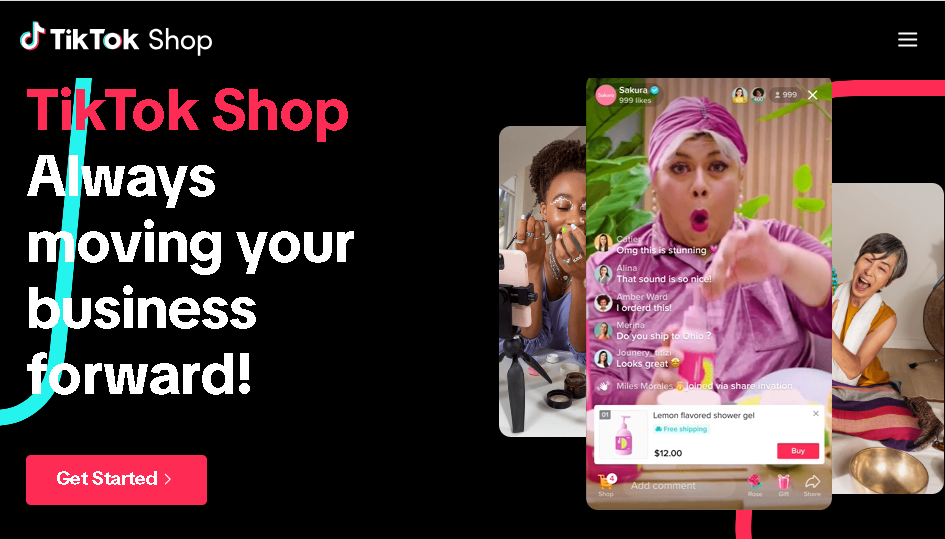
TikTok Shop is a pretty cool platform for anyone looking to sell products online, especially if your buyers hang out on TikTok a lot. It basically turns your business account into a mini online store.
You can also post videos showing off your products, do live selling sessions, and tag items directly in your content. Plus, you can get monetized on TikTok when using the short clips with this.
And, one of the best things about TikTok Shop is how natural its navigation and usage are. Instead of traditional ads, your products can show up in entertaining videos or live demos. That also makes it easier to connect with younger folks like Gen Z and Gen Alpha.
In fact, this platform lets you see post's insights with its built-in tools and analytics. Plus, you’ll get affiliate programs to make our buyers a source of promotion.
But like any platform, it’s not perfect. The setup process can feel a bit overwhelming, and it costs a lot in transaction fees. Still, if you're into creative content and want to reach a fresh audience, TikTok Shop is definitely worth trying out.
Top Features of the TikTok Shop Platform
Go live to promote or sell digital or physical things.
Make videos with some editors to design.
Get the Shop Page to show your items.
Contain campaigns and promotions with tools.
Handle the shop, items, order, and so on with the apps.
Includes an affiliate program to promote to your buyers.
TikTok Shop Pros
Simple and direct access for you to show items.
Allow integration with platforms like Shopify.
Includes no listing fees, which makes it affordable for brands.
Find secure checkout, order management, and support.
TikTok Shop Cons
Hard to set up as a beginner.
Costs a lot more than most platforms.
Why Go for TikTok Shop?
This platform is a popular choice if you want to sell items where people are already spending their time. It’s also great for brands that focus on trendy, visually appealing items and want to make a brand through short videos and live content.
But that’s not all, you can quickly show off your products through posts or live streams. It also works with platforms like Shopify, which means you can manage your online store and TikTok Shop together.
Plus, there are no listing or processing fees when using this platform. So, it’s budget-friendly for small businesses and creators.
The platform also gives you useful tools like secure checkout, order tracking, and seller support. Besides, this helps you handle orders without too much hassle.
However, keep in mind that the competition is high, with many sellers already using it. Also, the costs can add up with a commission of around 4.86% to 11.34% and a transaction fee of 3.50% to 3.78%. Other than these, it’s worth trying.
TikTok Shop Pricing
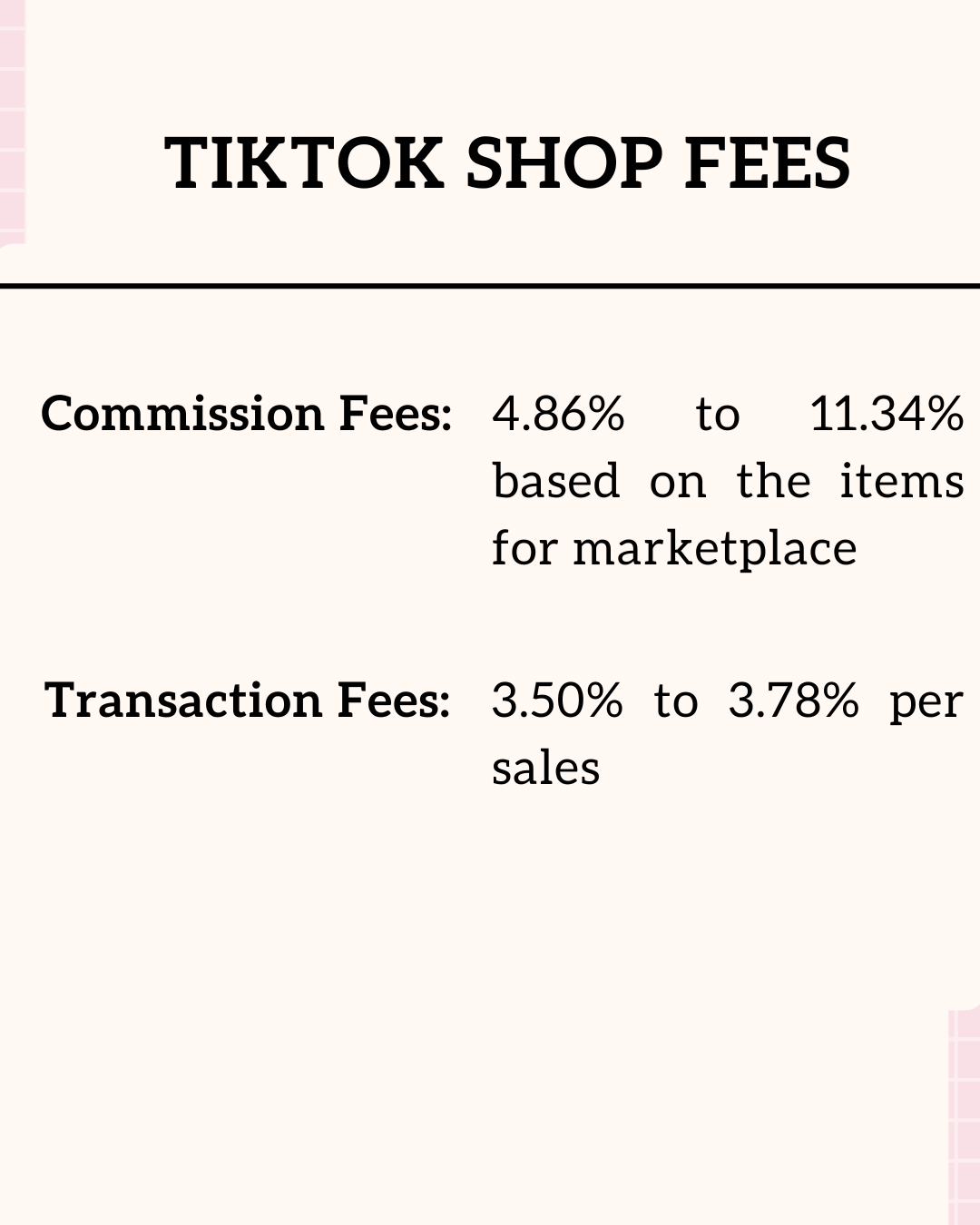
This platform takes a commission of around 4.86% to 11.34% based on the items in the marketplace. Plus, it costs 3.50% to 3.78% for transaction fees.
Also Read Here: How Many Followers on TikTok to Get Paid
#7 Wix
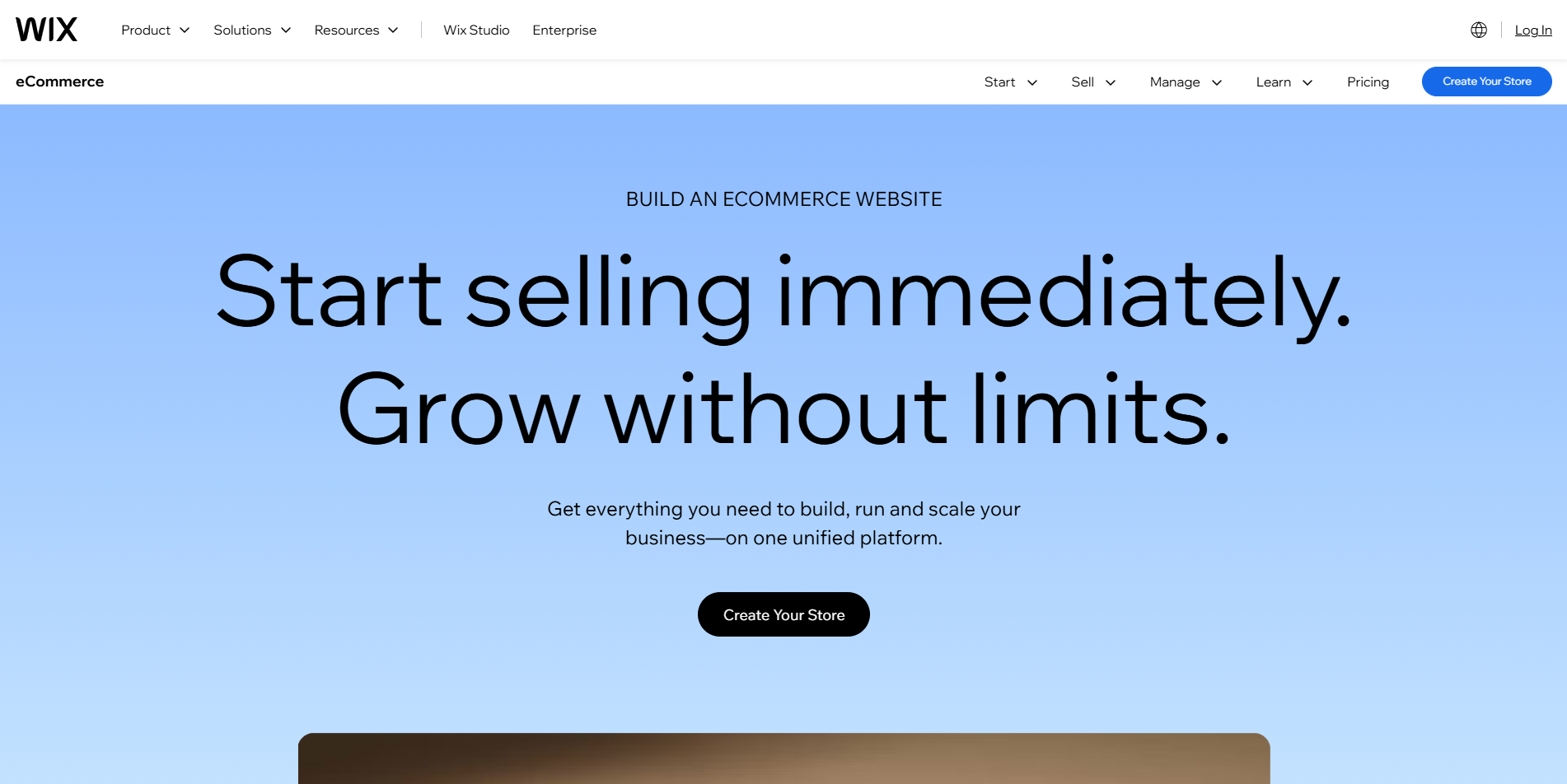
Wix is a user-friendly eCommerce solution that helps you launch your online stores with confidence. Its intuitive drag-and-drop editor also lets you do edits with no need for a tech expert or skills.
In fact, this platform comes with layouts and product pages to tailor to match your brand’s personality. It also offers a wide selection of modern and customizable templates for online selling.
Besides, this platform gives your store an edge without extra design costs. Plus, you can easily manage product listings, add images, set pricing, and handle payments. With built-in tools like SEO support, email marketing, and analytics, you can grow your audience.
But just a heads-up, Wix can charge extra if you use third-party payment options or want some of the newer eCommerce options. If that sounds like a hassle, you might want to check out a few other Wix alternatives instead.
On the whole, Wix is ideal for those who want to get online fast and start selling with minimal hassle.
Top Features of the Wix Platform
Get 900+ ready-made website templates.
Add physical and digital items.
Find built-in AI tools to use.
Give items in-store via Wix Retail or Mobile POS.
Integrate with platforms like Etsy, eBay, and so on.
Contains 80+ payment gateways.
Wix Pros
Easy-to-use design with drag-and-drop tools, with no coding needed.
Offers many templates for different types of businesses.
Ideal platform for startups and small businesses.
Comes with built-in marketing tools like email campaigns and SEO options.
Wix Cons
Charges extra fees when using third-party payment options.
Some advanced eCommerce options need additional apps.
Why Go for Wix?
This platform is perfect if you’re looking for a simple way to start selling online. You can also use this platform if you’re a newbie and don’t want to deal with complex coding.
Plus, its drag-and-drop design makes it super easy to create your store. So, if you’ve never built a site before, you can still design and décor your store.
It also offers tons of templates that suit different types of brands, no matter if you're selling items like clothing, jewelry, or art. In fact, you can easily pick a template that matches your style and customize it to fit your brand.
You’ll also find built-in marketing tools like email campaigns and SEO options. Plus, it helps you grow your online presence without needing to use extra services.
That said, if you plan on using third-party payment methods or need some advanced eCommerce features, you might face extra fees. But if you’re just starting out and want a smooth, user-friendly platform, Wix is definitely worth considering.
Wix Pricing
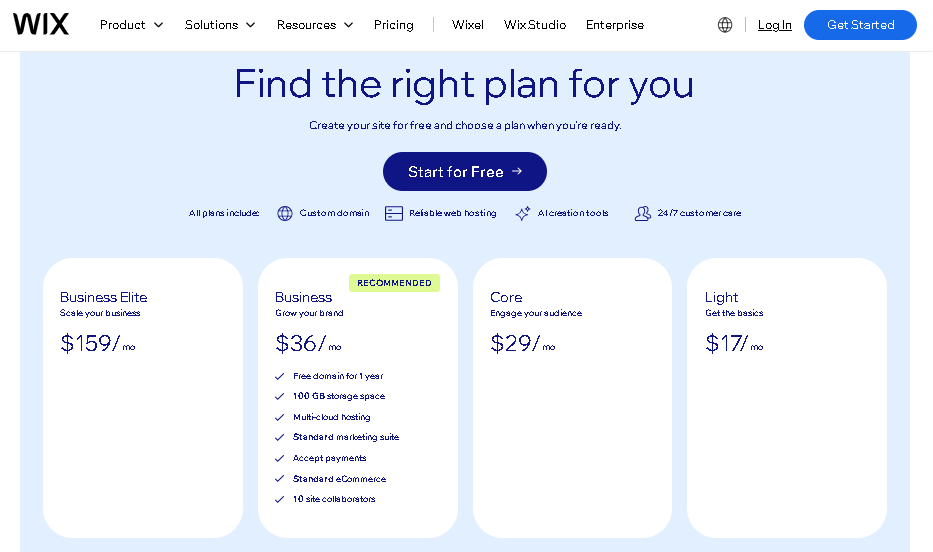
Light Plan: $17 per month on the annual plan.
Core Plan: $29 per month on the annual plan.
Business Plan: $36 per month on the annual plan.
Business Elite Plan: $159 per month on the annual plan.
#8 Squarespace
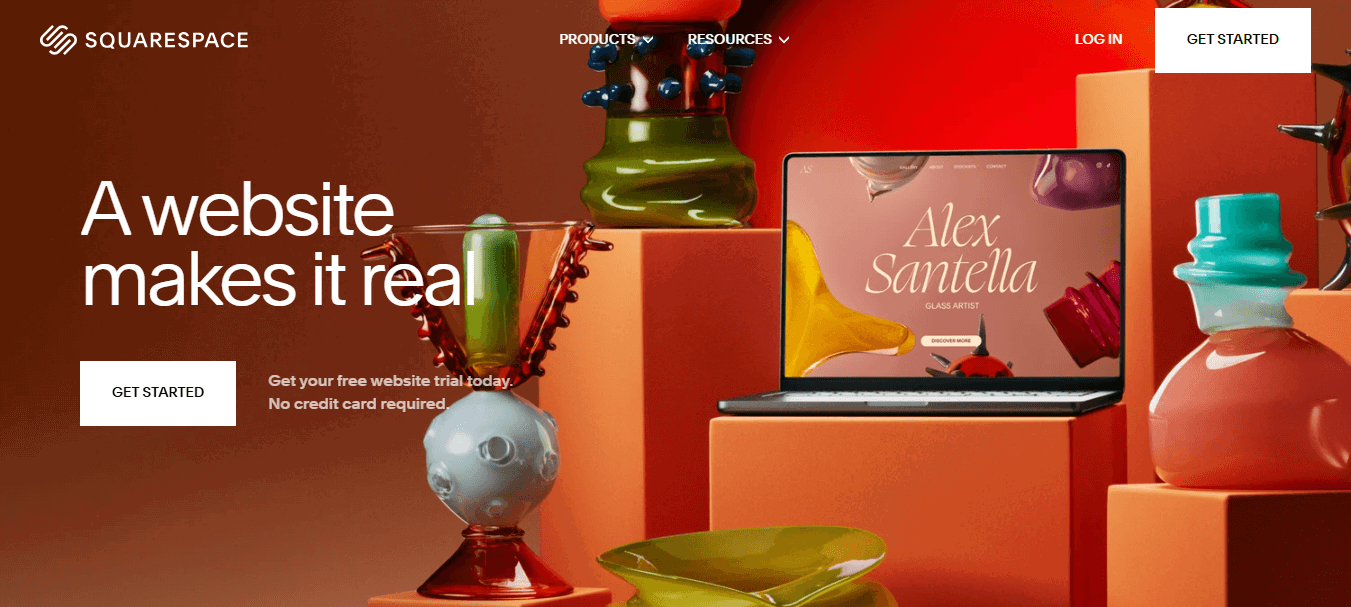
Squarespace is a top-notch website platform for anyone who wants to start selling products or services online. It’s also ideal for small business owners, artists, and creators who want their shop to look clean and modern.
You can also sell digital items and add special options at checkout, like extras or upgrades. On top of that, it lets you sell gift cards or subscriptions. Moreover, you can use AI tools to help design pages faster.
This platform also lets you pick how to deliver items with local delivery, pickup, or shipping. Plus, it accepts popular payment methods like Pay, Klarna, and so on. This platform also helps you manage your orders and buyer details with built-in tools.
If you need a lot of advanced features or want to grow a very large business, Squarespace may feel limited. But for small shops or service businesses, it’s an easy, good-looking, and useful way to sell online.
Besides, it has no option for PayPal or Stripe payment. Plus, this platform gives fewer extensions and eCommerce options. In that case, you can go for a Squarespace alternative to get better options.
Top Features of the Squarespace Platform
Show items, add details, and design using its AI.
Sell add-ons at the checkout.
Get local delivery, pickup, and shipping options.
Accepts payment options like Pay, Klarna, and so on.
Manage order details and profile with management tools.
Add gift cards, subscriptions, and other stuff.
Squarespace Pros
Provide amazing templates and layout options to use.
The UI is simple to navigate.
Find tools for SEO, site, email marketing, and analytics.
Make an online store, book appointments, and sell items or content.
Squarespace Cons
No option for PayPal and Stripe payments.
Contain fewer extensions and eCommerce options.
Why Go for Squarespace?
This platform is a good choice if you want to sell things online and have a site that looks professional. It’s also a great option for small business owners, artists, and anyone offering services or online items.
Plus, it gives you beautiful templates to single out so your site looks great from the start. This platform is also easy to use, even if you’ve never made a site before.
Moreover, you can add products, set prices, and design your pages by simply dragging and dropping items. It also lets you use SEO tools to help people find your store on Google, send marketing emails, and so on.
The best part? You can also sell both physical and digital products, book appointments, and even offer subscriptions.
So, if you want something simple, good-looking, and easy to manage, especially for a small or creative business, Squarespace is a smart pick.
Squarespace Pricing
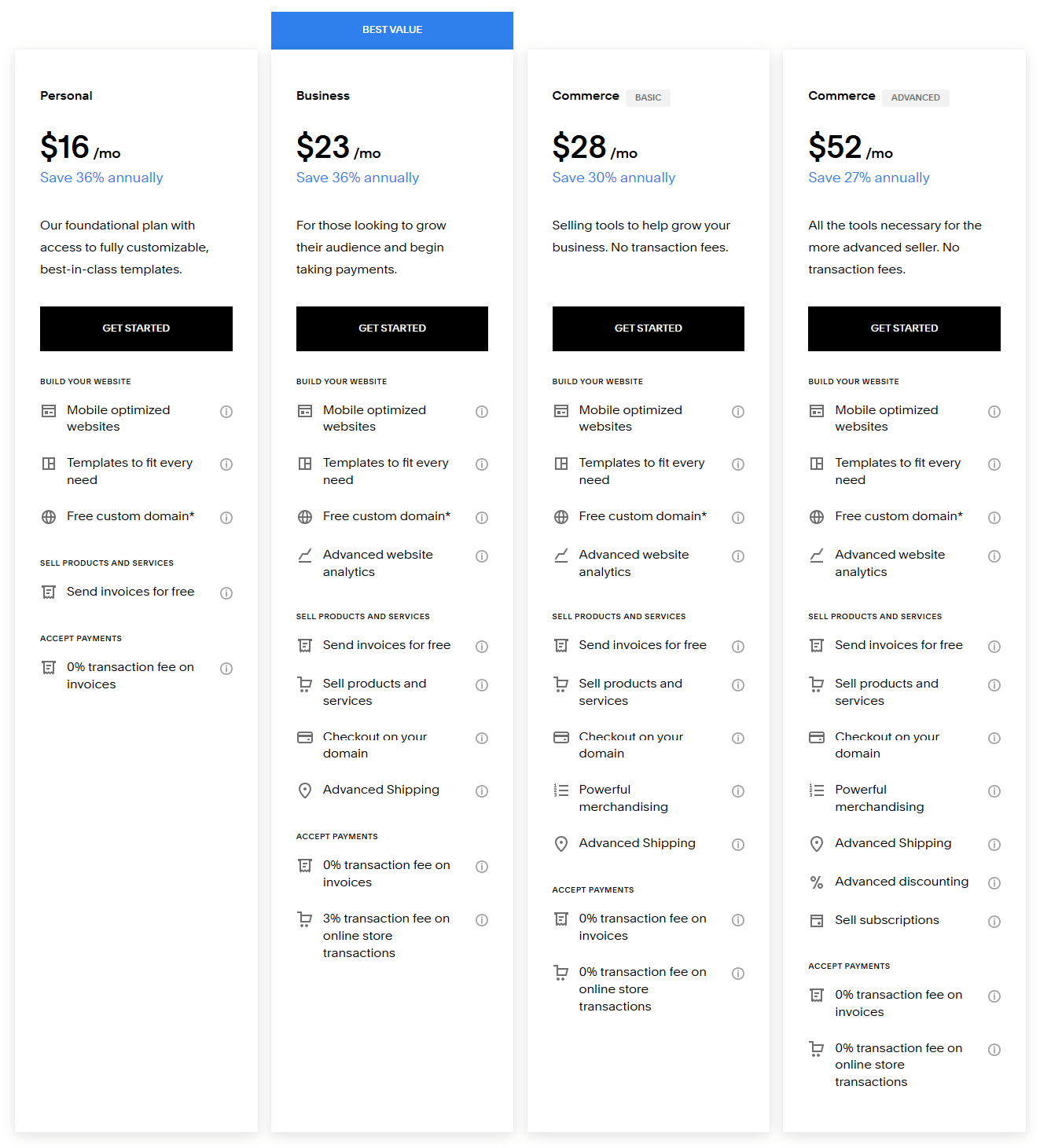
Personal Plan: $16 per month on the annual plan.
Business Plan: $23 per month on the annual plan.
Commerce Basic Plan: $28 per month on the annual plan.
Commerce Advanced Plan: $52 per month on the annual plan.

#9 Podia

Podia is a well-liked platform for creators who want to sell digital products like online courses, digital downloads, memberships, and communities. It also comes with a user-friendly design that you can use to make your store with no tech support.
Not to mention that it allows you to create clean, professional-looking sales pages, manage customer relationships, and so on.
And, a major plus is that it includes built-in email marketing tools. This can also save you money on third-party software. Plus, you can send broadcasts, set up email campaigns, and automate your messages to improve your marketing strategy.
In addition, this platform offers upsells, product bundles, and coupon codes for you to add. With that, you can earn passive income.
It also has no mobile app on any of its plans. Plus, it lacks tools to customize the site or get insights with analytics. Not a fan of these downsides? You can just go for Podia alternatives. Well, Podia is a great choice for beginners or small business owners to sell items.
Top Features of the Podia Platform
Add videos, files, and lessons to sell in an organized way.
Host webinars directly from the website.
Launch your items and set up a sales page with ease.
Get a global tax calculation option with tools.
Includes coupons, upsells, and payment plans.
Provide paid and unpaid membership tiers.
Podia Pros
Sell online courses, digital items, webinars, memberships, and other things.
Accept payment gateways like PayPal and Stripe.
Integrate with tools like Drip, Kit, and so on.
Includes live chat and email support.
Podia Cons
No mobile app.
Contains fewer customizable tools and stats.
Why Go for Podia?
If you're a blogger, freelancer, course creator, or someone just starting to sell digital products online, Podia can be a very helpful platform. It's also made for people who want a simple way to sell things like courses, digital downloads, memberships, or build a community.
Plus, it works well with payment tools like PayPal and Stripe, so you can easily get paid. It also connects with other useful tools like Drip and Kit to help you with marketing. Besides, you get live chat and email support, which is great if you ever need help.
Additionally, you don’t need to make complicated sales funnels. Instead, you get simple tools like coupon codes, upsells, and product launches to help you grow your business step by step.
However, Podia might not be the best fit if you need deep customization or advanced analytics. Also, it doesn't have a mobile app yet.
If you want an easy and affordable way to start selling your digital content online, Podia is a solid choice. Plus, it is a great choice for creators and small businesses.
Podia Pricing
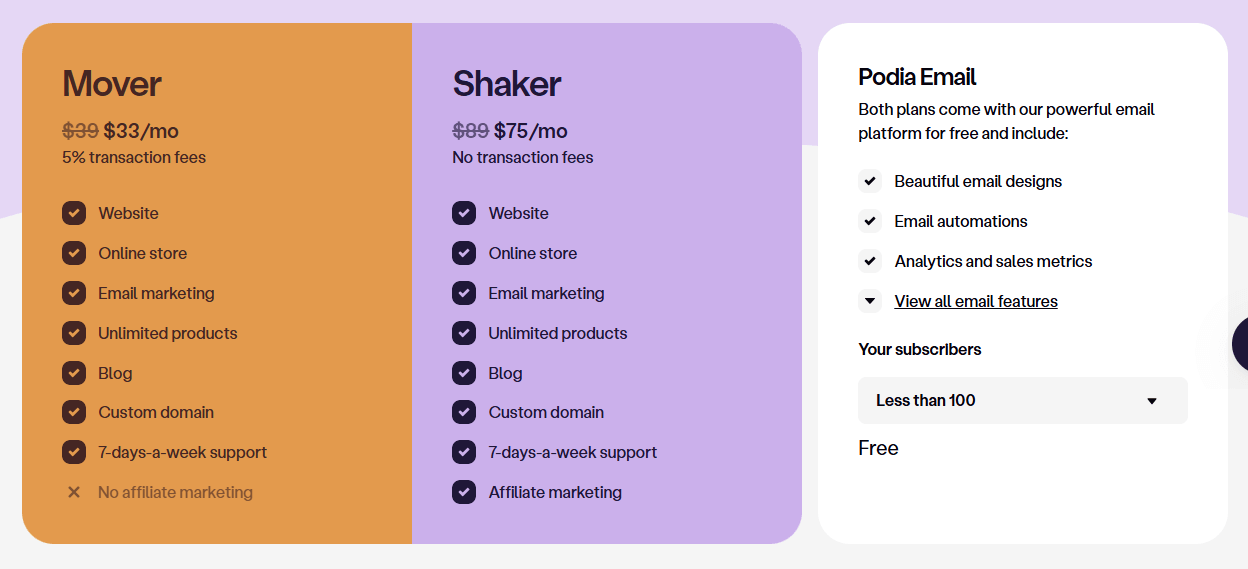
Mover Plan: $33 per month on the annual plan.
Shake Plan: $75 per month on the annual plan.
Podia Email: $0 per month on the annual plan.
Also Read Here: Kajabi vs Podia
#10 Hostinger
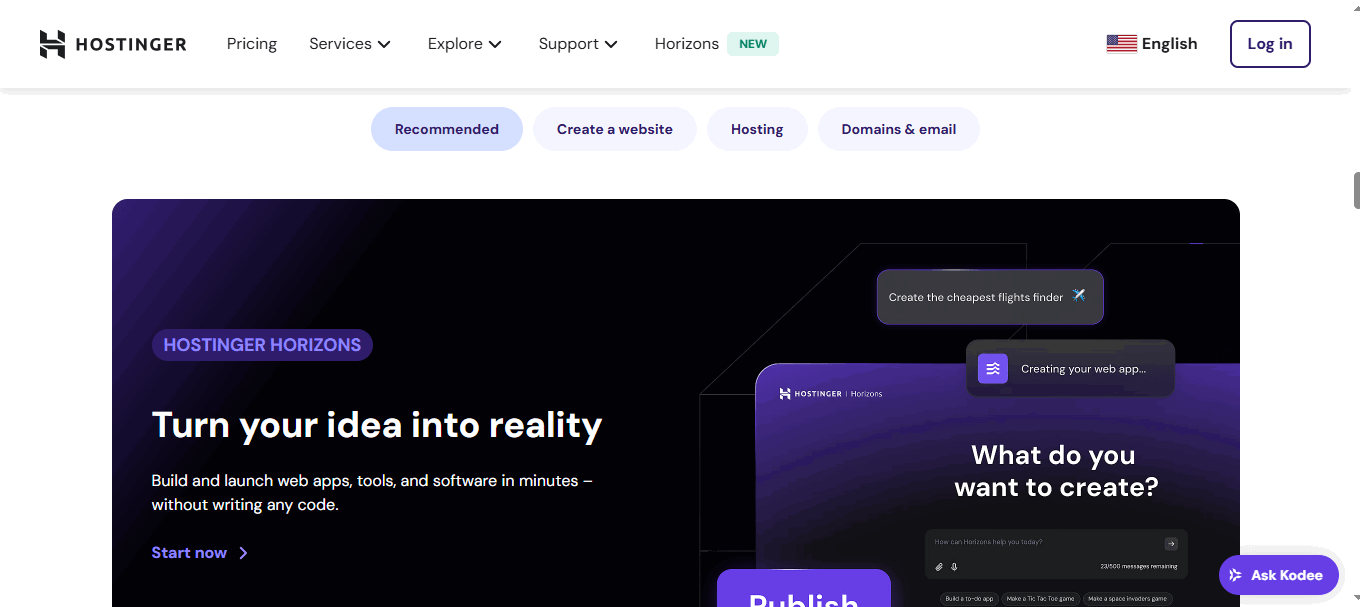
Hostinger is a reliable and beginner-friendly platform that makes selling online easy, especially for small businesses or creators starting out. With low-cost hosting plans, it becomes accessible for those who want to build an online store without spending too much at the beginning.
Besides, its integration with e-commerce tools is a cool aspect. It also supports platforms like WooCommerce and a one-click installer for WordPress.
Plus, it gives you a free domain, SSL certificate, and solid security options. Not to mention that the website builder is another strong feature that lets you use drag-and-drop tools to design sites.
You can also create clean, responsive, and mobile-friendly product pages quickly. Plus, it has fast-loaded speeds and reliable uptime. However, it lacks options to sell things well and contains no dedicated hosting server.
But then, this platform offers 24/7 customer support through live chat, which is very helpful if you run into any issues. Overall, it's a great platform for selling online.
Top Features of the Hostinger Platform
Get a drag-and-drop site builder to make an online store.
Integrate with WordPress, Cloud, and so on platforms.
Find an e-commerce platform to sell digital or physical items.
Handle 499+ items, orders, and stock via the dashboard.
Allow 20+ payment methods.
Includes AI and marketing tools.
Hostinger Pros
149+ ready-made templates added to the design.
Sell items like ebooks, online courses, digital memberships, and apps.
Contains 24/7 client support to get quick responses.
Track online store performance with Google Analytics and AdSense.
Hostinger Cons
No helpful or managed hosting server added.
Missing options to sell items properly.
Why Go for Hostinger?
Hostinger stands out as a smart and practical choice if you're planning to start selling items online. Compared to many other platforms, it offers a balance of affordability, performance, and user-friendly options.
You’ll also get powerful tools and reliable hosting without paying high monthly fees. Plus, it’s perfect for entrepreneurs who want to lessen startup costs. It also adds free essentials like a domain name, SSL certificate, and email accounts.
With its drag-and-drop website builder, you can launch a store and design it. It also offers you some integration tools like one-click WordPress, WooCommerce, and so on.
Lastly, their 24/7 customer support means help is always available if you face any issues. Moreover, it is simple to reach out.
In general, it's a great platform for selling online if you're looking for an affordable, secure, and easy-to-use plan to make your store.
Hostinger Pricing
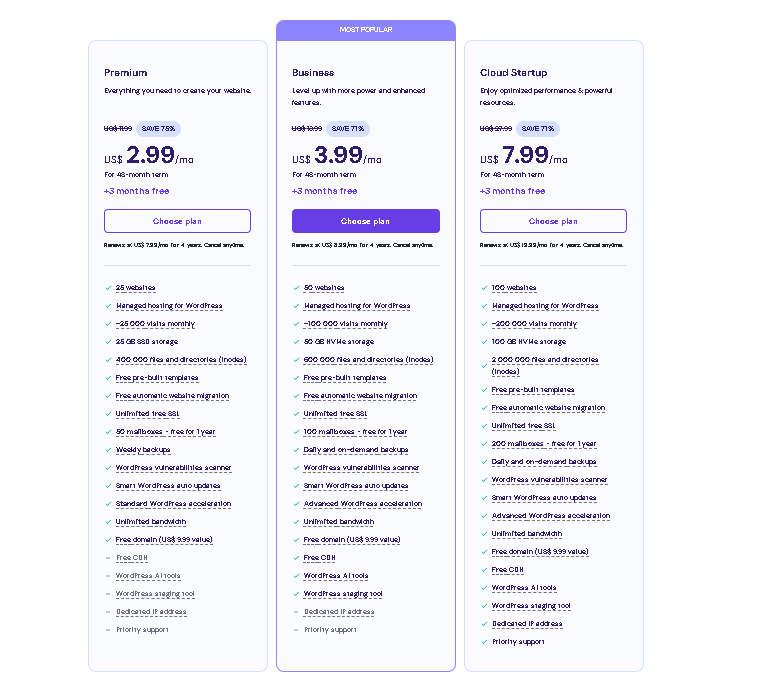
Premium Plan: $3.49 per month on the annual plan.
Business Plan: $4.49 per month on the annual plan.
Cloud Startup Plan: $9.99 per month on the annual plan.
7 Simple Steps to Start Selling Online with a Platform
You can start selling online using a platform by following the given easy yet effective steps for a constant result. It includes:
Know Who Your Customers Are
Before selling, you need to understand who will buy from you. Are they teenagers, parents, professionals, or pet lovers? Knowing this also helps you create products and messages that attract them.
Pick the Right Products to Sell
Pick products that people want and that you can manage easily. You can also make your own products, buy them from others, or sell digital items like eBooks and artworks.
Select Your Sales Platform
Decide where you want to sell. With that, you can also sell on online platforms like EzyCourse, Amazon, eBay, Etsy, and so on to show your items along with images.
Set Up Payment Gateways
Try to make it easy for your buyers to pay you with proper payment methods. For that, you can use services like PayPal, Stripe, or your bank’s payment system. It also allows your buyers to pay using credit cards or other options at peace of mind.
Decide How You'll Ship Products
Think of a delivery option that you can use to deliver the items your buyer paid for. In that case, you can ship them by yourself or use a service like FedEx, DHL, or a local delivery company. Just be clear about delivery time and cost.
Tell People About Your Store
Promote your selling ideas using social media, email, or online ads to build brand credibility. You can also work with influencers to find a solid fan base. Apart from that, it’s good to run giveaways or offer discounts to bring in more buyers.
Keep improving
Always look for ways to do better. You can also ask for your customer feedback, check what’s selling well, and update your store and products regularly.
EzyCourse is the best online selling platform for you to get a marketplace where you can sell things like courses, digital or physical items, community, and so on, with no hassle. |
Why Do You Need Platforms to Sell Online
Let’s say you’ve got some great products. Maybe you’re making something by hand or found the perfect items to resell. To do that, you can build your own site if you’ve got the time, budget, and tech know-how.
But here’s the thing, you can go for the easy way with the already-present platform that gives you everything to sell items. Here’s why you need one:
1. Skip the Tech Stress and Just Sell
Imagine being able to just upload your product, write a simple description, and boom, you’re live. That’s exactly what online platforms let you do.
With that, you can easily make your own store with no need for coding or other hassles to host or crash a site. It also lets you just focus on what you're good at: your products.
And yeah, there might be small fees that each platform charges. But when you think about how much it costs to build and maintain your own site, it kind of evens out.
2. Reach a Group of People Who Want to Buy
One of the biggest struggles in selling online is getting people to actually find your store. Like, let’s be real, having a site means nothing if no one visits it.
But this gets easier when you try selling things on a platform. Well, they already have the traffic and resources that you’ll need to do great work.
Plus, people are literally searching for stuff every second on those platforms. So, you’re not begging for attention when they’re already looking. And you can show up easily when posting your items on those platforms.
3. Enter New Markets and Grow
You can start small by trying things out when selling things. But once you're on these platforms, things can scale quicker than you expect. Suddenly, someone from another city or country wants to buy from you.
In fact, this is only possible when you market your items on a platform. With that, you don’t need to plan to expand globally as they already have a well-known marketplace.
And when you start seeing those orders coming in from places you’ve never even been to, it hits differently. That’s also what these platforms unlock for you to access without effort.
4. Learn Just by Watching Successful Sellers
This part is underrated, but super valuable. When you’re selling on an online platform, you can see your competitors and their tricks. Thanks to this, it doesn’t require you to do Udemy courses to pick up a few tricks.
Like, you can notice how they price different items, write their titles, the kind of photos they use, and so on. Just being in that space teaches you things you didn’t even realize you needed to know when selling things on a platform.
5. Find Unexpected Opportunities
When you’re on an online platform, you can end up connecting with suppliers or getting bulk orders. It also helps you find creators who want to collaborate or work with you.

What Can You Sell Online on a Platform
There are a lot of things that you can sell digital or physical items online using a platform. It includes:
Physical Products
Handmade goods.
Clothing and accessories.
Home décor.
Beauty or wellness items.
Printed books.
Digital Products
Ebooks in PDF, EPUB, and so on.
Templates, planners, spreadsheets.
Graphics, fonts, stock images.
Digital art and illustrations.
Instructional PDFs or guides.
WordPress themes/plugins.
Online courses.
Video lessons.
Downloadable tutorials.
Coaching or consulting as a service.
Which is the Best Online Selling Platform?
Going for the best online selling platform is not that hard if you know what you need on your mind. Now, you can do that after reading this in-depth guide!
Just be sure to look into the transaction and pricing aspects. With that, check the features, marketing tools, affiliation, email marketing, and so on. That way, you can also go for one knowing it has everything in one place.
In that case, EzyCourse is your all-in-one option that lets you have everything to sell online with proper marketing options to grow your business and ensure income. To know if it’s good or not, you can try its 14-day free trial.






